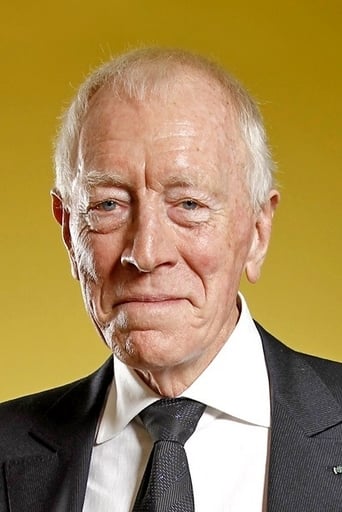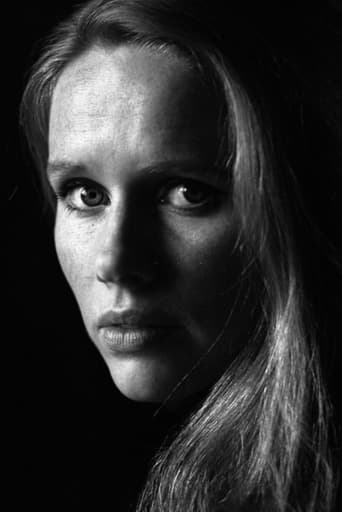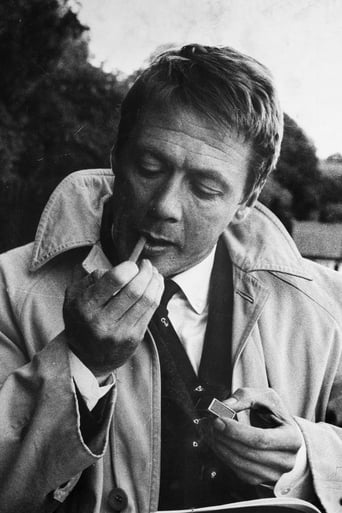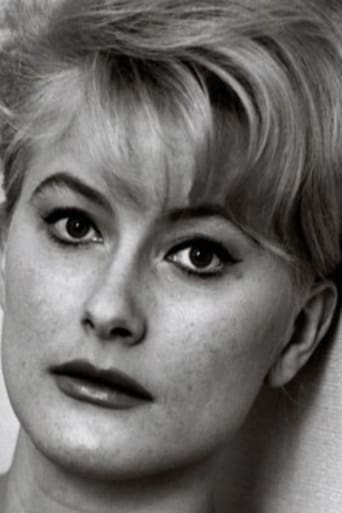Jeanskynebu
the audience applauded
Crwthod
A lot more amusing than I thought it would be.
StyleSk8r
At first rather annoying in its heavy emphasis on reenactments, this movie ultimately proves fascinating, simply because the complicated, highly dramatic tale it tells still almost defies belief.
Geraldine
The story, direction, characters, and writing/dialogue is akin to taking a tranquilizer shot to the neck, but everything else was so well done.
lasttimeisaw
Swedish filmmaker Jan Troell's categorical pièces-de-résistance, a diptych, 7-hours long saga based on his fellow countryman, the literature titan Vilhelm Moberg's THE EMIGRANTS ensemble. Divided into THE EMIGRANTS and THE NEW LAND, this 19th-century epic holds a dear look at the travails of an ordinary Swedish household, the Nilsson family, resides in the Småland hinterland, when (mostly natural) adversity mounts against their livelihood, the eldest son Karl Oskar (von Sydow) mulls over the prospect of emigrating to the United States. A proposition deprecated by his wife Kristina (Ullmann) initially, but when poverty and hunger is aggravated by the premature death of one of their brood, she eventually accedes, joining their emigrating pack are Karl Oskar's younger brother Robert (Axberg), his farmhand friend Arvid (Lindstedt), the family of Kristina's uncle Pastor Daniel Andreasson (Edwall, a straight-up hard-hitter, brilliantly bringing about an air of smug virtuosity that treacherously verges on hubris), who is at loggerheads with the supercilious local parish clergy for preaching to the fallen ones (viz. those who are deemed not worthy of Christian gospel), among whom a former prostitute Ulrika (jazz chanteuse Monica Zetterlund), now a reborn woman, also partakes in the trek with her teenage daughter Elin (played by Monica's own daughter Eva-Lena Zetterlund). THE EMIGRANTS itself can be bisected into two halves, before and after the family's embarkment for the state of Freedom, during the former, Troell introduces the hardship and inequity (religious parochialism and mistreatment) with a pastoral equanimity (occasionally lard with invigorating drumbeats) and purveys his main characters with sufficient impetus for their longing for a reset button in an idealized country where everyone is (purportedly) being treated equally and fairly, especially for the young Robert, it is the California gold rush beckons him, and supports him against the cavalier abuse he receives on a daily base when working as a farmhand. Once their journey kick-starts, a looming nostalgia begins to sweep the cohort, Troell (who is also presiding over the cinematography department) fixes the valediction shot with a subdued solemnity, no goodbyes, tear-infused eyes, lingering looks are deployed, just a long-shot of the elderly parents seeing their children off in front of their house, incorporating the place into their final adieu, and the impact is ineffable. Tellingly, THE EMIGRANTS' most accomplished passage is the ten-weeks trans-Atlantic voyage on a wooden brig, and Troell valiantly re-enacts its sordid state of affairs with swingeing maritime verisimilitude when most passengers are fallen victims of sea-sick, life is snuffed within a two-by-four space, by scurvy or even quinsy (a pertinent reference to today's illegal immigrants' ordeal on the sea). Here Liv Ullmann holds court in two magnificent scenes, one is Kristina's altercation with Ulrika, both actress are emotively unsparing, and letting out their prejudice and retorts once for all, which also presciently serves as a catalyst for their eventually best-friends transition; the other is when Kristina, apparently in extremis, exchanges with Karl Oskar their fondness, as if for the last time, by confessing that they are each other's best friends, a superlative affirmation that true love does exist thanks to the two players' most poignant delivery. Once the survivors touches the terra firma but incognita, they are still miles away from where they will start life anew, hopping on the train and later a steamer, than on foot, when they finally reach their destination in Minnesota, their first dream is dashed by a boastful liar who never expect his lie will be debunked in his face, and THE EMIGRANTS finishes when Karl Oskar finds their new land under their new identities, American homesteaders. Right picking up where its predecessor leaves, THE NEW LAND takes place entirely in the new land, where the Swedish emigrants forming a somewhat enclave, mostly living among themselves, which brings about a problematic issue about the story's sense of locality and Troell's inaction of alleviate this anonymity, if it is not for the random appearances of the indigenous Indians, one can safely surmise that the household is still live in their homeland, with very similar sylvan exuberance and harsh winter-time, and not much foreignness to interact with, in a way, it takes the shine off one of the story's focal points: displacement. Yet, what THE NEW LAND excels in, is that oater flashback of Robert, who manages to stay alive just long enough after a futile gold-digging attempt with Arvid, a sounding slap in the face to the wide-eyed daydreamers, the pair is saddled with the same drudgery and hardship (not to mention Robert's potluck is rooked by deception) that ultimate will cost them both their young lives, here Troell launches a more hallucinogenic experiment in accentuating the pair's delirium and exhaustion when wandering in the desert, to admirable effect. Eddie Axberg has weathered convincingly in honing up Robert's tale of woe, and his final resignation with fate effectually brings a lump in one's throat. Life goes on, as Karl Oskar's household finally prospers, a God-fearing Kristina turns out to be benighted enough to risk her own life for the sake of procreation, indoctrinated as a wife's sacrosanct duty, even after receiving the doctor's warning that another pregnancy would become her undoing, together with a less disinterested depiction of a wanton slaughter during the Sioux Uprising, by suggestion that it is at the expense of those white homesteaders' hospitality upon which the Indians conducts their retaliation, THE NEW LAND's luster starts to ebb away, notwithstanding a show-stopping Max von Sydow consistently radiates with plebeian bonhomie, sympathy and mettle from stem to stern of the entire roman-fleuve.
Red-125
Utvandrarna and Nybyggarna
The Swedish film Utvandrarna was shown in the U.S. with the title The Emigrants (1971). The film Nybyggarna was shown with the title The New Land (1972). Both movies were co-written and directed by Jan Troell. Troell was also the cinematographer and the editor of both. (Sounds crazy, but he did it.)
The films are actually one long film, broken in half so that each could be seen separately.
As can be guessed from the titles, the first film sets up the plot by showing us that, despite intelligence and hard work, many families couldn't make a living on the small plots of land in Sweden. The second film follows the family from Sweden to the United States.
The situation for them in the U.S. isn't that much better when they arrive, but they have reasonable hope that they will succeed.
Max von Sydow plays the husband, Karl Oskar, and Liv Ullmann plays his wife, Kristina. Both are extraordinarily talented. In addition, Von Sydow is handsome, and Ullmann is impossibly beautiful.
The remainder of the cast is strong, and the acting by the children is wonderful.
These movies will work better on the large screen, but we had to settle for the small screen. Both films carry very high IMDb rating of 8.0. I gave each a 10.
Sindre Kaspersen
Swedish screenwriter, film editor, cinematographer and director Jan Troell's third feature film which he edited, photographed and wrote with Swedish screenwriter and producer Bengt Forslund, is an adaptation of the novels "The Emigrants" (1949) and "Unto a Good Land" (1952) by Swedish author Vilhelm Moberg (1898-1973) which is the first two parts of his tetralogy, "The Emigrants suite" (1949-1959). It premiered in Sweden, was shot on locations in Denmark, Sweden and USA, is the first part of a two-part film which was succeeded by "The New Land" (1972) and produced by Bengt Forslund. It tells the story about Karl-Oskar Nilsson who lives on a farm in Ljuders socken, Småland, Sweden with his father, his mother and his brother Robert. When Karl-Oskar meets seventeen-year-old Kristina Johansdotter, he falls in love with her and later he marries her. Kristina gives birth to several children and they become a happy family, but as time goes by it gets harder and more challenging to run the farm, much due to the harvest. After reading an ad in a newspaper about free land in North-America, Karl-Oskar begins to consider emigrating from Sweden with his family. Acutely and engagingly directed by Jan Troell, this period drama, set against the backdrop of Sweden during the 1840s and 1850s, draws an extensive and gripping portrayal of a group of farmers and Christians who emigrate from their homeland, a humane portrayal of a close friendship between two young farmhands and a compassionate portrayal of an evolving relationship between a farmer and is housewife. While notable for its poignant art direction by Swedish production designer P.A. Lundgren (1911-2002), the distinct cinematography by Jan Troell and the fine costume design by Swedish costume designer Ulla-Britt Söderlund (1943-1985), this character-driven and dialog-driven historic epic where the natural surroundings plays an important and symbolic part, examines themes like family relations, interpersonal relations, friendship, poverty, courage and dignity.This Swedish production which was a big investment in Swedish cinema at the time, depicts several studies of character, has a significant atmosphere which is emphasized by the naturalistic milieu depictions and the subtle score by Swedish composer Erik Nordgren (1913-1992) and is impelled and reinforced by the empathic and involving acting performances by Swedish actors Max von Sydow, Allan Edwall (1924- 1997), Eddie Axberg and Pierre Lindstedt, Swedish actress and singer Monica Zetterlund (1937-2005) and Norwegian actress Liv Ullmann who was nominated for an Academy Award for Best Actress in a leading role at the 45th Academy Awards in 1973, marking her as the first Norwegian actress ever to gain an Academy Award nomination. A cautiously narrated and memorable historic drama which gained, among other awards, the Golden Globe Award for Best Actress Liv Ullmann and Best Foreign Language Film at the 30th Golden Globe Awards in 1973, the NYFCC Award for Best Actress Liv Ullmann at the New York Film Critics Circle Awards in 1973, the Jussi Award for Best Foreign Filmmaker Jan Troell at the Jussi Awards in 1972 and was nominated for five Academy Awards in 1973.
tangoviudo
Even without 40 minutes of its original running time (trimmed by the idiots at Warner Brothers, who couldn't see American audiences sitting through a 3-hour film), "The Emigrants" is one of the greatest films ever made in Sweden - and probably the finest so far about the immigrant experience.Troell's film was also the most expensive production to date (1971) in Sweden, which outraged many Swedes and made them attack the film quite unfairly. Box Office receipts worldwide, however, persuaded Hollywood that Troell was "bankable" and gave him a few shots at at fame and fortune ("Zandy's Bride" and "The Hurricane" - the latter to have been directed by Roman Polanski just prior to his banishment from America). Luckily, Troell failed in Hollywood and went back to Sweden.






